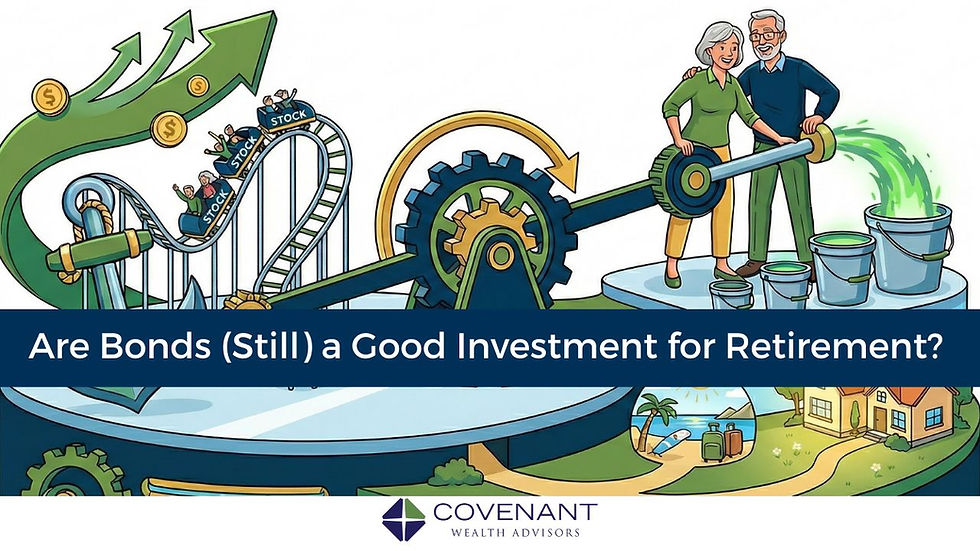How Average Stock Market Returns Can Fail Investor Expectations
- Mark Fonville, CFP®

- May 2, 2019
- 4 min read
Updated: Nov 1, 2023

The average stock market return for US stocks has been around 10% since 1926.
That's historical fact.
So, should you expect 10% returns in your portfolio if you are invested in 100% US stocks?
Unfortunately, the answer is a big, no!
While average stock market returns over the long-term reveal a rosy picture, short-term results may vary.
In any given period stock returns can be positive, negative, or flat. In fact, even long periods of time can produce disappointing results.
When setting expectations for yourself, it’s helpful to see the range of outcomes experienced by investors historically.
For example, how often have the stock market’s annual returns actually aligned with its long-term average?
Let's find out.
Average Stock Market Returns Through 2018
In Exhibit 1 below, you'll notice calendar year returns for the S&P 500 Index since 1926.
The shaded band marks the historical average of 10%, plus or minus 2 percentage points.
Shockingly, the S&P 500 Index had a return within this range in only six of the past 93 calendar years!
In most years, the index’s return was outside of the range—often above or below by a wide margin—with no obvious pattern.
For investors, the data highlight the importance of looking beyond average returns and being aware of the range of potential outcomes.

How Often Do We See Positive Returns with the S&P 500?
Despite the year-to-year volatility, investors can potentially increase their chances of having a positive outcome by maintaining a long-term focus.
Exhibit 2 documents the historical frequency of positive returns over rolling periods of one, five, and 10 years in the US market.
The data show that, while positive performance is never assured, investors’ odds improve over longer time horizons.
Even so, you'll notice that over 5% of the time, the S&P 500 produced negative returns over 10 year periods.
This is very important to understand and accept as an investor. The potential for low or negative returns in the S&P 500 (or any market) is a major reason we recommend diversifying your portfolio beyond US stocks.
If you don't accept this as an investor, you simply shouldn't invest in stocks in the first place.

CONCLUSION
While some investors might find it easy to stay the course in years with above average stock market returns, periods of disappointing results may test an investor’s faith in equity markets.
Being aware of the range of potential outcomes can help investors remain disciplined, which in the long term can increase the odds of a successful investment experience.
What can help you endure the ups and downs?
While there is no silver bullet, understanding how markets work and trusting market prices are good starting points.
An asset allocation that aligns with personal risk tolerances and investment goals is also valuable.
By thoughtfully considering these and other issues, investors may be better prepared to stay focused on their long-term goals during different market environments.

Mark Fonville, CFP®
Mark has over 18 years of experience helping individuals and families invest and plan for retirement. He is a CERTIFIED FINANCIAL PLANNER™ and President of Covenant Wealth Advisors.
[1]. As measured by the S&P 500 Index from 1926–2018.
Source: Dimensional Fund Advisors LP.
There is no guarantee investment strategies will be successful. Investing involves risks, including possible loss of principal. Diversification does not eliminate the risk of market loss.
All expressions of opinion are subject to change. This article is distributed for informational purposes, and it is not to be construed as an offer, solicitation, recommendation, or endorsement of any particular security, products, or services.
Disclosure: Covenant Wealth Advisors is a registered investment advisor with offices in Richmond and Williamsburg, VA. Past performance is no guarantee of future returns. Investing involves risk and possible loss of principal capital. The views and opinions expressed in this content are as of the date of the posting, are subject to change based on market and other conditions. This content contains certain statements that may be deemed forward-looking statements. Please note that any such statements are not guarantees of any future performance and actual results or developments may differ materially from those projected. Please note that nothing in this content should be construed as an offer to sell or the solicitation of an offer to purchase an interest in any security or separate account. Nothing is intended to be, and you should not consider anything to be, investment, accounting, tax, or legal advice. If you would like accounting, tax, or legal advice, you should consult with your own accountants or attorneys regarding your individual circumstances and needs. No advice may be rendered by Covenant Wealth Advisors unless a client service agreement is in place. Hypothetical examples are fictitious and are only used to illustrate a specific point of view. Diversification does not guarantee against risk of loss. While this guide attempts to be as comprehensive as possible but no article can cover all aspects of retirement planning. Be sure to consult an advisor for comprehensive advice.
Registration of an investment advisor does not imply a certain level of skill or training.



